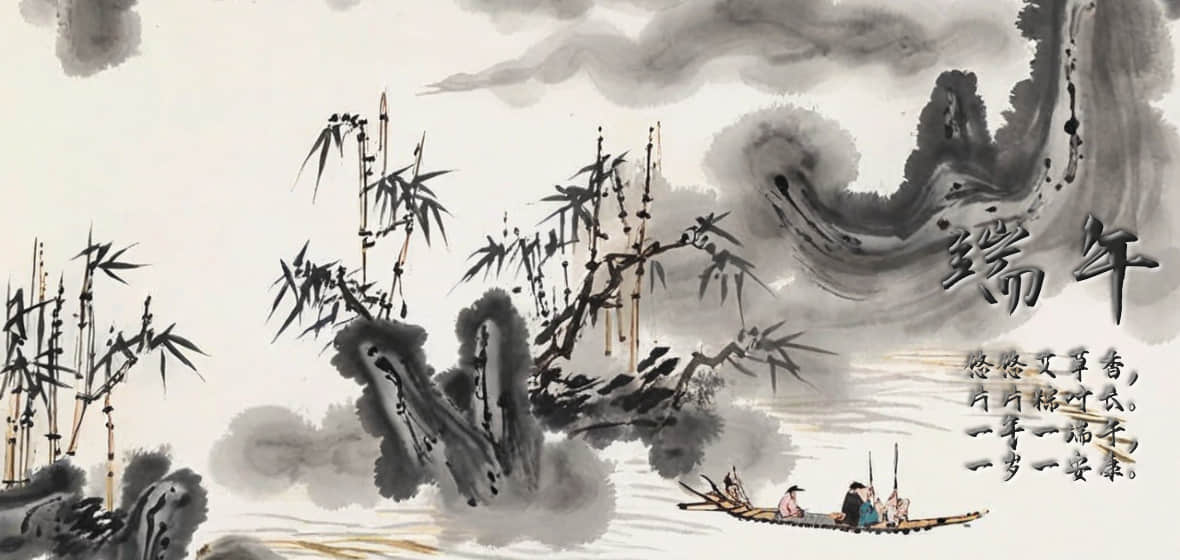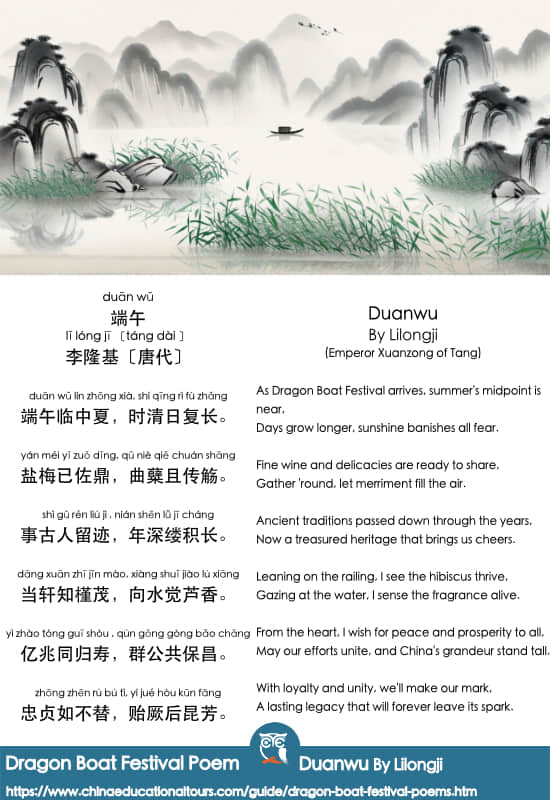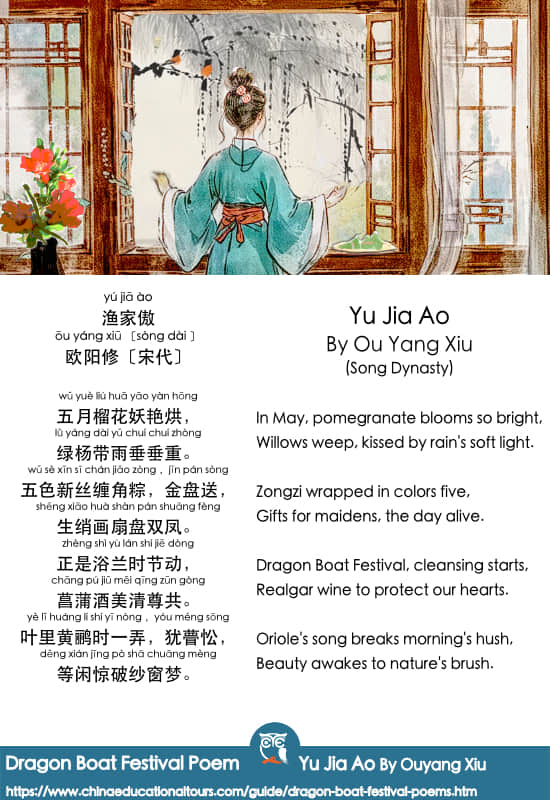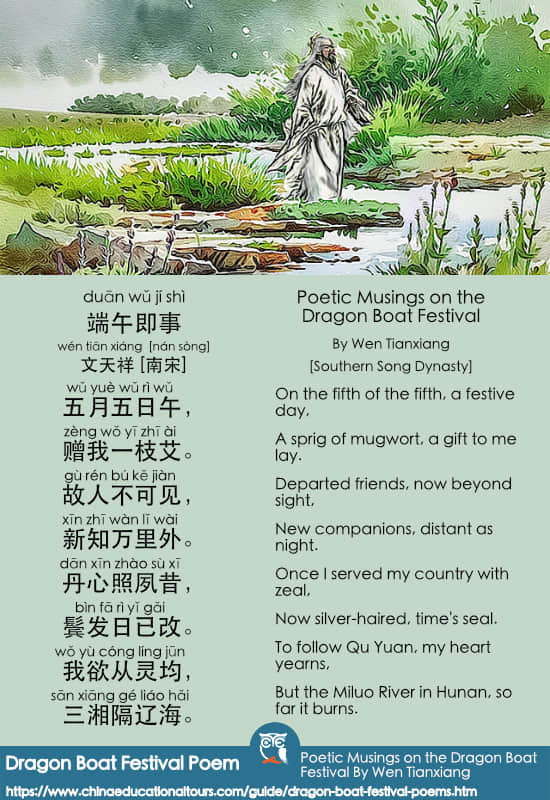Dragon Boat Festival Poems

The fragrance of wormwood wafts, and the leaves of calamus grow in abundance. One year, one Dragon Boat Festival, and one year of good health.
Traditional Dragon Boat Festival activities include dragon boat racing, making zongzi (glutinous rice dumplings), and hanging wormwood, among others. Throughout history, many poets have written poems to record and express their feelings during the Dragon Boat Festival.

duān wǔ
端午
Duanwu
lǐ lóng jī 〔táng dài 〕
李隆基〔唐代〕
By Lilongji (Emperor Xuanzong of Tang)
duān wǔ lín zhōng xià ,shí qīng rì fù zhǎng
端午临中夏,时清日复长。
As Dragon Boat Festival arrives, summer's midpoint is near,
Days grow longer, sunshine banishes all fear.
yán méi yǐ zuǒ dǐng ,qǔ niè qiě chuán shāng
盐梅已佐鼎,曲糵且传觞。
Fine wine and delicacies are ready to share,
Gather 'round, let merriment fill the air.
shì gǔ rén liú jì ,nián shēn lǚ jī cháng
事古人留迹,年深缕积长。
Ancient traditions passed down through the years,
Now a treasured heritage that brings us cheers.
dāng xuān zhī jǐn mào ,xiàng shuǐ jiào lú xiāng
当轩知槿茂,向水觉芦香。
Leaning on the railing, I see the hibiscus thrive,
Gazing at the water, I sense the fragrance alive.
yì zhào tóng guī shòu ,qún gōng gòng bǎo chāng
亿兆同归寿,群公共保昌。
From the heart, I wish for peace and prosperity to all,
May our efforts unite, and China's grandeur stand tall.
zhōng zhēn rú bú tì ,yí jué hòu kūn fāng
忠贞如不替,贻厥后昆芳。
With loyalty and unity, we'll make our mark,
A lasting legacy that will forever leave its spark.
Good to Know: Emperor Xuanzong of Tang, personal name Li Longji (8 September 685 – 3 May 762 ), was the longest-reigning emperor of the Tang Dynasty. He ruled from 712 to 756, a total of 44 years.
The poem "Duanwu" is a classic five-character ancient poem. It uses the Dragon Boat Festival as its backdrop to express people's respect for history and tradition, their appreciation of natural scenery, and their aspirations for a better life, as well as their loyalty and love for the country. The poem captures the joyful, harmonious, and uplifting spirit of the festival, and conveys people's warm wishes for a wonderful life.

yú jiā ào
渔家傲
Yu Jia Ao | Fisherman’s Pride
ōu yáng xiū 〔sòng dài 〕
欧阳修〔宋代〕
by Ou Yang Xiu (Song Dynasty)
wǔ yuè liú huā yāo yàn hōng
五月榴花妖艳烘,
In May, pomegranate blooms so bright,
lǜ yáng dài yǔ chuí chuí zhòng
绿杨带雨垂垂重。
Willows weep, kissed by rain's soft light.
wǔ sè xīn sī chán jiǎo zòng ,jīn pán sòng
五色新丝缠角粽,金盘送,
Zongzi wrapped in colors five,
shēng xiāo huà shàn pán shuāng fèng
生绡画扇盘双凤。
Gifts for maidens, the day alive.
zhèng shì yù lán shí jiē dòng
正是浴兰时节动,
Dragon Boat Festival, cleansing starts,
chāng pú jiǔ měi qīng zūn gòng
菖蒲酒美清尊共。
Realgar wine to protect our hearts.
yè lǐ huáng lí shí yī nòng ,yóu méng sōng
叶里黄鹂时一弄,犹瞢忪,
Oriole's song breaks morning's hush,
děng xián jīng pò shā chuāng mèng
等闲惊破纱窗梦。
Beauty awakes to nature's brush.
Good to know: This "Yu Jia Ao" or Fisherman’s Pride is a Song Ci poem depicting the customs and sentiments of the Dragon Boat Festival in May (Lunar calendar). Written by Ouyang Xiu during his visit to Li Duanyuan's home, the poem vividly portrays the festival. It uses symbols like "pomegranate blossoms," "willows," and "zongzi" to create a joyful atmosphere of the Dragon Boat Festival. The first part describes the customs of the festival, while the second part depicts scenes of people bathing, changing clothes, and drinking realgar wine to ward off evil spirits. The entire poem captures the poet's leisurely and contented life during the festival, brimming with a sense of joy and pleasure, immersing the reader in the festive atmosphere.
Ouyang Xiu (August 6, 1007 – September 8, 1072) was a leading figure in the literary world of the Song Dynasty, known for pioneering a distinct literary style. He, along with other prominent figures like Han Yu, Liu Zongyuan, Su Shi, Su Xun, Su Zhe, Wang Anshi, and Zeng Gong, were collectively known as the "Eight Great Masters of Tang and Song Dynasties".

duān wǔ jí shì
端午即事
Poetic Musings on the Dragon Boat Festival
wén tiān xiáng [nán sòng]
文天祥 [南宋]
By Wen Tianxiang [Southern Song Dynasty]
wǔ yuè wǔ rì wǔ
五月五日午,
On the fifth of the fifth, a festive day,
zèng wǒ yī zhī ài
赠我一枝艾。
A sprig of mugwort, a gift to me lay.
gù rén bú kě jiàn
故人不可见,
Departed friends, now beyond sight,
xīn zhī wàn lǐ wài
新知万里外。
New companions, distant as night.
dān xīn zhào sù xī
丹心照夙昔,
Once I served my country with zeal,
bìn fā rì yǐ gǎi
鬓发日已改。
Now silver-haired, time's seal.
wǒ yù cóng líng jūn
我欲从灵均,
To follow Qu Yuan, my heart yearns,
sān xiāng gé liáo hǎi
三湘隔辽海。
But Hunan, Miluo River, so far it burns.
Creation Background: In 1276, during the reign of Emperor Deyu, Wen Tianxiang was detained while on a diplomatic mission to the Yuan army. After escaping in Zhenjiang, he was unfortunately slandered by rumors. To express his determination, he wrote this five-character ancient poem.
It was the Dragon Boat Festival, but the poet felt increasingly lonely as his friends were not by his side. He had a burning desire to serve his country, yet he was falsely accused. He initially considered sacrificing his life to prove his loyalty, but ultimately chose a different path from Qu Yuan in hopes of reviving the Southern Song Dynasty. This reflects his unwavering devotion to the court and his steadfast spirit of loyalty and righteousness.
Author Introduction: Wen Tianxiang (June 6, 1236 - January 9, 1283), originally named Wen Yunsun, was a native of Ji'an, Jiangxi Province. He was a high-ranking official in the late Southern Song Dynasty, a literary figure, and a national hero. Wen Tianxiang authored numerous poetry collections. Among his works, the last two lines of the poem "Crossing Lingdingyang" are particularly famous: "人生自古谁无死rén shēng zì gǔ shuí wú sǐ , , 留取丹心照汗青 liú qǔ dān xīn zhào hàn qīng. Since ancient times, everyone will die. Let me leave a loyal heart shining in the annals of history." These lines, expressing passionate patriotism and a life philosophy of sacrificing oneself for righteousness, have become essential learning for every Chinese person.
OR
Are you eager to begin your Chinese cultural journey?
Drop us a line and we will promptly connect you with our leading China expert!